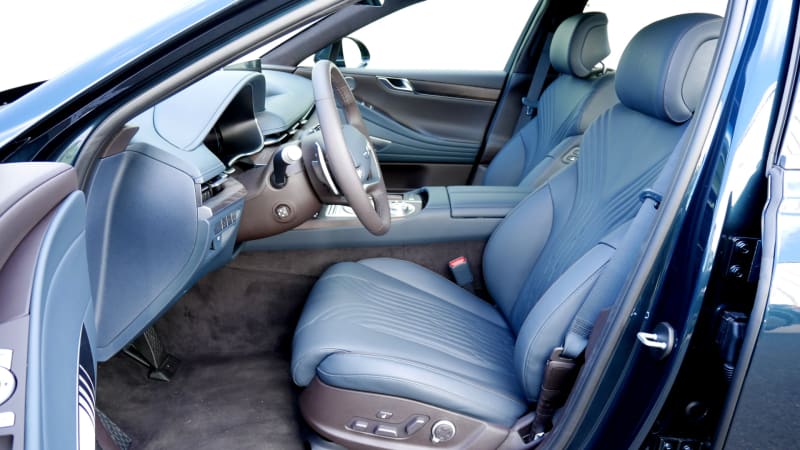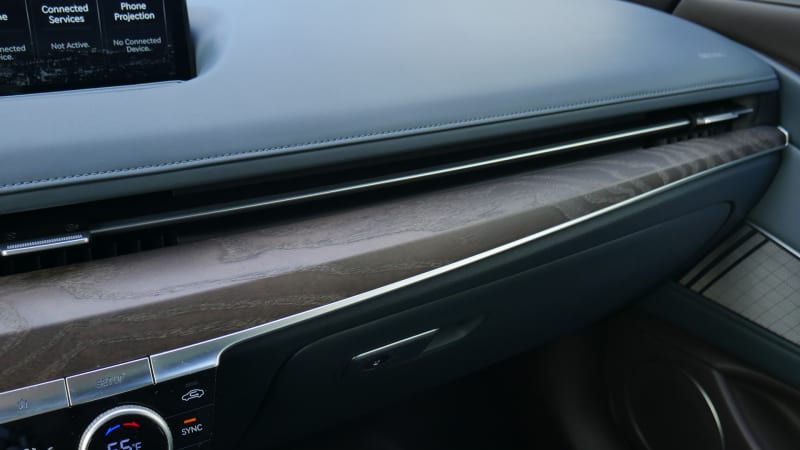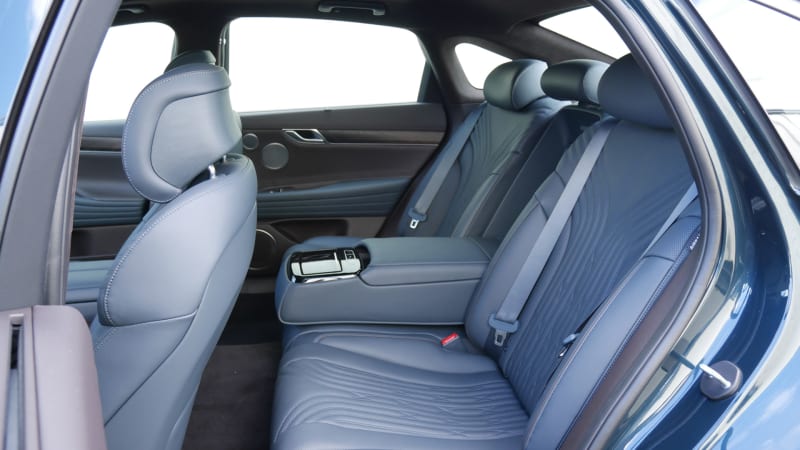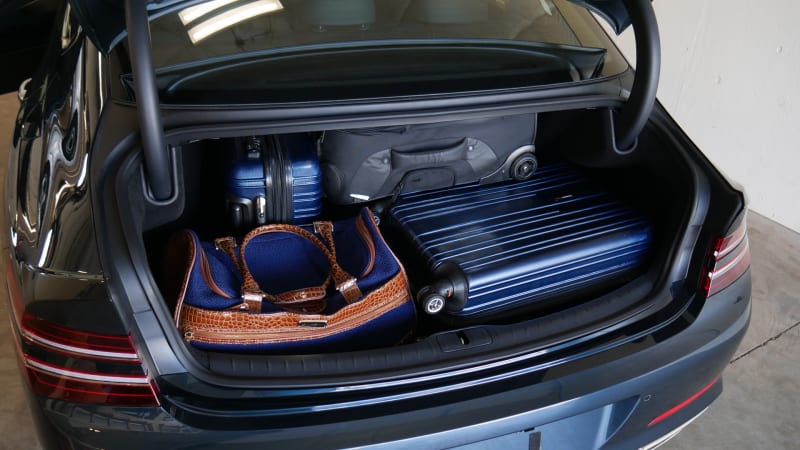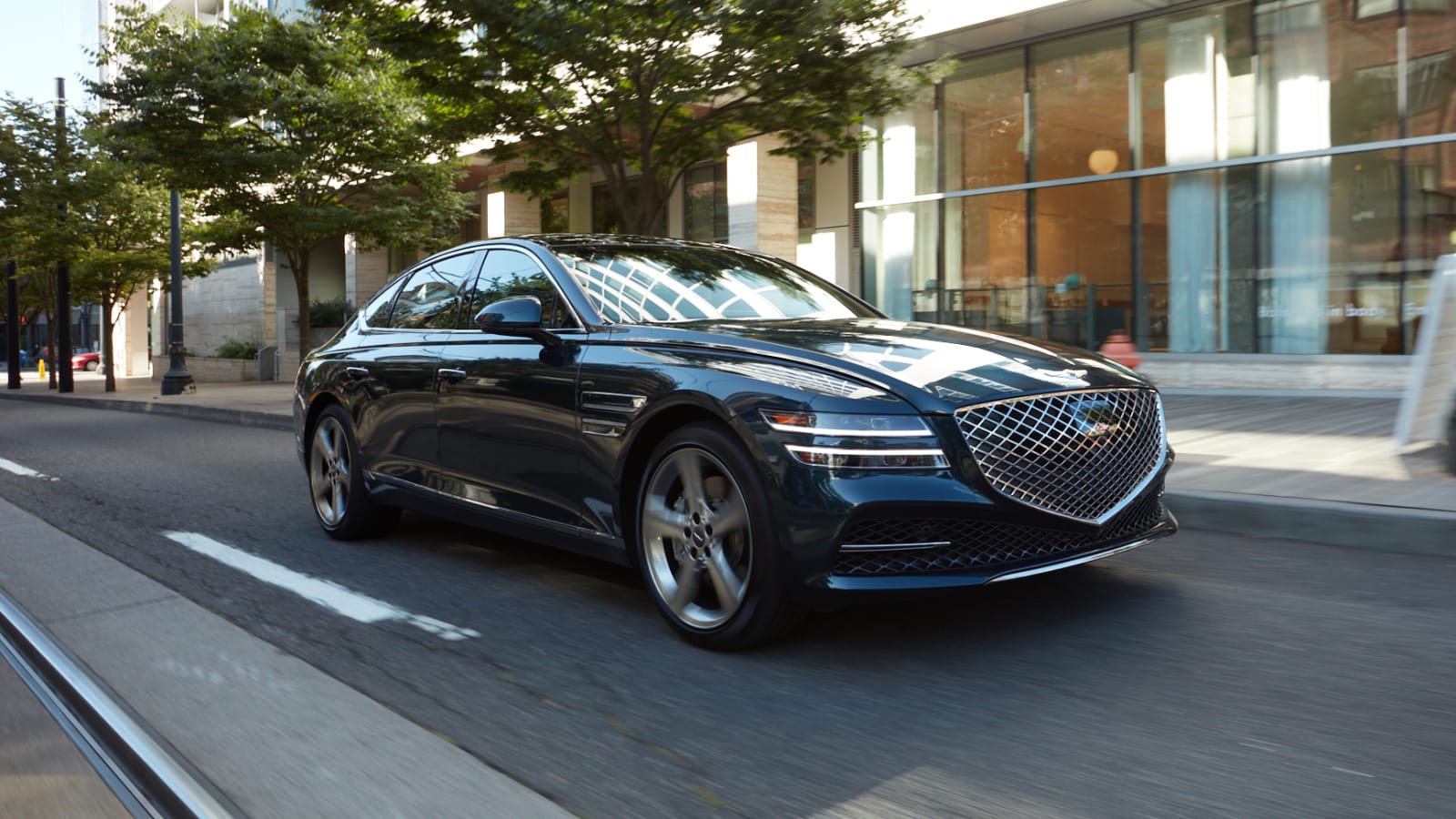What’s the interior and in-car technology like?
While we come away impressed with every version of the G80 we’ve tested, it was the top-of-the-line 3.5T Prestige model with its deep blue leather accented in chocolate brown and rich matte-finish wood trim that really made us go “wow.” It really looks sensational. Unique, too, which is definitely something that matters in this high-priced segment. There are different two-tone schemes available (see photo gallery at the top of the page), which may not be as distinctive, but are still quite classy and memorable.
Quality throughout is excellent, with many surfaces covered in a convincing leather substitute, plus that opulent stretch of wood across the dash and on the center console. New switchgear is exclusive to Genesis (no more Hyundai bits and pieces) and everything looks and feels like it belongs in a proper luxury car.
Standard is the new Genesis infotainment system that consists of an immense 14.5-inch touchscreen supported by a center console controller that basically acts like an old iPod thumbwheel. This combination of new-and-old Apple-style control interfaces sure made sense during our tests – a touchscreen is great for many functions, but the wheel makes scrolling through songs, contacts or radio stations much easier. We also like that Genesis maintains physical controls for volume, tuning and various menu shortcuts. To be fair, there’s an argument that a knob like BMW’s iDrive would be better than the flat wheel.
As for what it all controls, the feature content is immense but the layout is simple. If there was any area where the G80 is clearly related to a Hyundai it’s here, and it’s a good thing. Though a tad fancier in appearance (a defused image of nighttime Seoul sits in the background of menus, for instance), its functionality is just as excellent as what you get in the top-of-the-line Sonata. Actually, it’s just a bit better due to its two extra inches of screen width.
How big is it?
The G80 is virtually the same length as the BMW 5 Series and Audi A6, and an inch longer than the Mercedes E-Class. The specs say its 3 to 4 inches wider than that lot, but Genesis did not indicate if its dimensions include the mirrors or not. Genesis also didn’t indicate interior dimensions, but we can report definitely that there is plenty of backseat legroom, as your 6-foot-3 author was able to comfortably sit behind his own driving position. There was also sufficient headroom despite that sloping roofline.
As for the seats themselves, they are surprisingly contoured and decidedly un-bench-like. You should be able to ride comfortably back there for long stretches of time. The front seats, meanwhile, can be heated, ventilated and offer a range of adjustments, including a power cushion extender and adjustable side bolsters that can automatic push in and out depending on drive mode.
We don’t have an official cargo number, but we managed to bring along our luggage test bags for our first look of the 2021 G80. We could fit everything except the biggest roller bag inside, but there was still plenty of space left over. In total, it’s not quite as good as a midsize sedan like a Hyundai Sonata, but that’s actually normal for this luxury segment that sacrifices space for styling and rear-wheel-drive architecture.
![]()
![]()
![]()
![]()
What’s the performance and fuel economy?
The 2021 G80 comes standard with a 2.5-liter turbocharged inline-four that produces 300 horsepower and 311 pound-feet of torque. An eight-speed automatic is standard, and there’ll be a choice of standard rear-wheel drive or optional all-wheel drive. The 2.5T RWD is rated at 23 mpg city, 32 mpg highway and 26 combined, while the 2.5T AWD gets 22/30/25 mpg.
The upgrade engine is a 3.5-liter turbocharged V6 that produces 375 hp and 391 lb-ft of torque. It has the same transmission and drivetrain options as the 2.5T. No 0-60 performance data were provided at the time of this writing. Fuel economy drops to 19/27/22 with RWD and 18/26/21 with AWD.
What’s it like to drive?
If you’re looking for a silent runabout, the 2.5T should be your engine of choice, as it nary makes a peep in normal driving. There is some hesitation when flooring the accelerator and the engine responding, but that’s almost certainly the result of the car preventing ham-footed drivers from inadvertently spinning the rear wheels and engaging traction control. We also describe its acceleration as “sufficient” for a large luxury sedan.
To exceed that, the twin-turbo 3.5-liter V6 is the way to go. It doesn’t hesitate like the 2.5 to get underway, and pulls smoothly up the revs. It also knows when to make its voice heard. Chiefly under hard acceleration, its smooth baritone soundtrack filters its way into the cabin, then recedes into the background once at cruising speed. With the extra power, we also found ourselves more apt to reach for the paddle shifters to enjoy the quick, smooth shifts of the G80’s eight-speed transmission. The 3.5T also comes with an electronically controlled suspension guided by a road-scanning camera (a technology first seen on the current Mercedes S-Class). While we wouldn’t say you need the extra power, responsiveness and suspension prowess, we wouldn’t try to steer you away from spending the extra $11,400 to move up to the V6 and everything it brings with it.
Regardless of powertrain, the ride is compliant without being bouncy or floaty, but the 3.5T’s more advanced suspension does add a healthy dose of refinement. The chassis’ ability to sort out the imperfections and the noise from the road is admirable, even as surfaces change from smooth tarmac to pocked pavement to loose gravel. There’s still enough tautness in the suspension to give it a sense of musculature as weight shifts through the corners, and though the steering weight feels artificial, it still communicates lateral grip from the tires. The all-wheel drive and stability control help keep things calm, too, guiding the nose around gravelly bends out on the colorful country roads of our route.
What more can I read about the Genesis G80?
Our first time actually driving the new G80. Though not as impressive as the interior design and finishing, the driving experience still checks the right luxury boxes.
![]()
What features are available and what’s the price?
Pricing starts at $47,700, including the $1,025 destination charge, for the base, rear-wheel-drive G80 2.5T. The all-wheel-drive 2.5T starts at $51,875.
Standard equipment includes 18-inch wheels, LED headlights, an advanced adaptive cruise control and a full suite of driver assist tech (see Safety section below), heated eight-way power front seats, leatherette upholstery, Apple CarPlay, Android Auto and the 14.5-inch touchscreen.
The Advanced package ($4,600) adds 19-inch wheels, a panoramic sunroof, a power trunk, three-zone auto climate control, ventilated front seats, matte finish wood trim, rear sunshades and a 21-speaker Lexicon sound system.
The 3.5T starts at $60,125 for RWD and $63,275 for AWD. It basically comes standard with the Advanced package but adds upgraded brakes and an adaptive suspension that anticipates road imperfections, plus leather upholstery, wireless charging, soft-close doors and a near-field communication digital key.
Those interior extras are also added in the 2.5T’s Prestige package ($8,300) along with extra driver assistance systems (see below) and an enhanced driver seat. The 3.5T Prestige package ($6,000) goes even further by adding Nappa leather seats, a microfiber suede headliner, a heated steering wheel, heated rear seats, a head-up display and an upgraded all-digital instrument panel.


